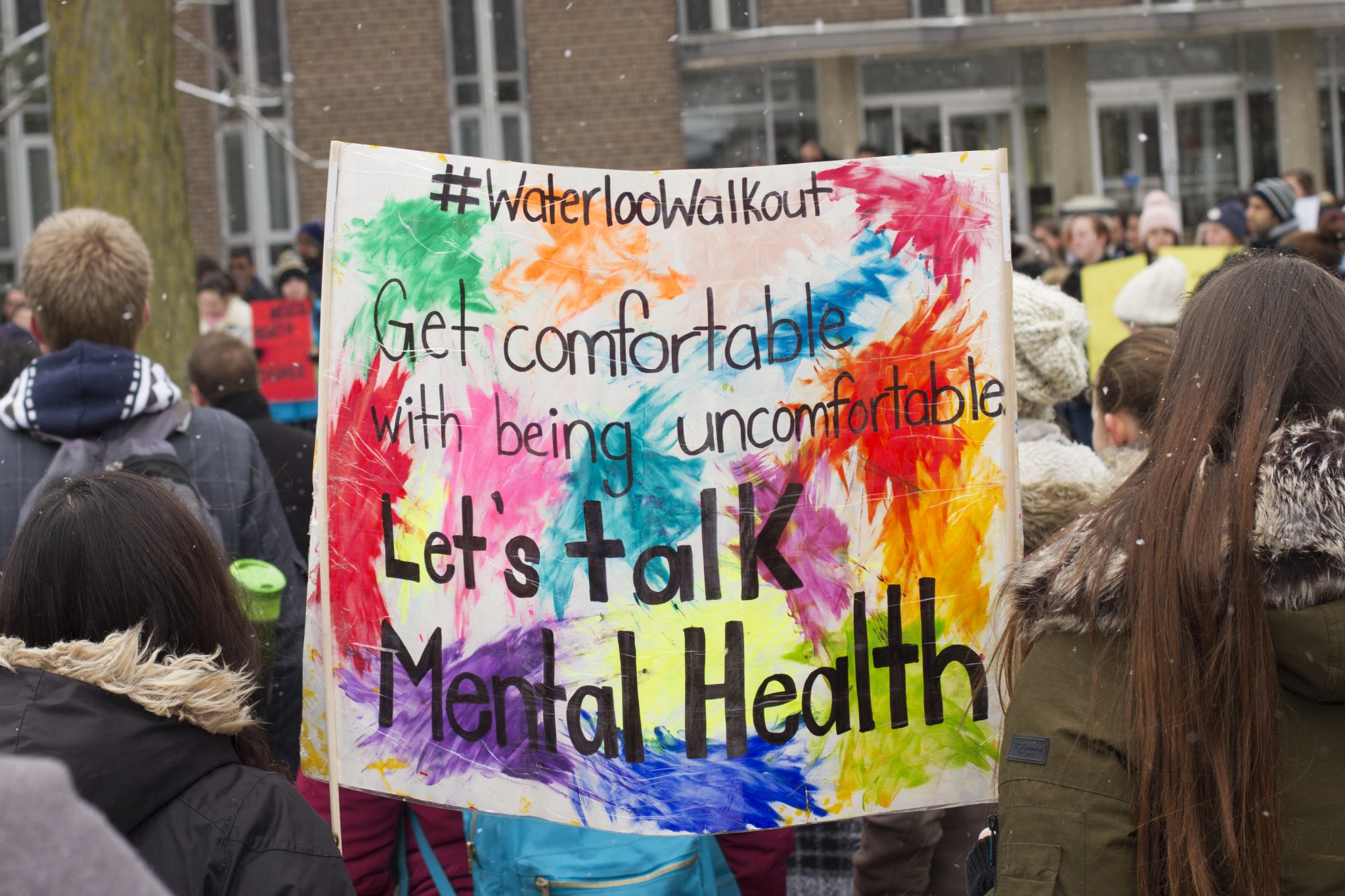UW students fight for better mental health care

Students at University of Waterloo gathered together in the arts quad on March 8 to protest against the lack of mental health support services on campus.
The Waterloo Walkout for mental health was a protest created by students in Discourse of Dissent, a multi-disciplinary course taught by Frankie Condon.
The Walkout was in response to the recent suicide of a student at Waterloo which occurred March 5 at 5 a.m. The recent suicide prompted the walkout, which pushed for change, increased mental health resources, a culture change and additional support from administration and staff in order to improve mental health on campus.
“The Waterloo Walkout for us is a way that students are withdrawing our consent and we’re not going [put up with] insufficient counselling services anymore, we’re not going to consent to the culture of competition and isolation at the University of Waterloo,” Kai Butterfield, University of Waterloo student, said.
Currently, there are 22 full-time equivalent counselling services staff and two full-time equivalent psychiatrists serving 31,380 undergraduate students and 5,290 graduate students.
Students at the university say this is not enough staff to support the students in need of mental health resources.
Butterfield explained that the walkout was not only meant to gather the attention of administrative staff, however, students are hoping they can take their concerns to an administrative level.
“On the administrative side we are working to get contact with our president. He did offer us an opportunity today but it was during the protest so we decided we would schedule it at a different time,” Butterfield said.
“We are opening up those avenues to speak to administration to take some of our concerns there.”
This is the tenth suicide since 2012 at the University of Waterloo. Just last January 2017 an 18-year-old student committed suicide. Two months after that another student took their own life at a residence building.
A popular topic of discussion at the Walkout was the culture at the University of Waterloo.
There was significant emphasis of students feeling stressed rather than supported in both their corporative learning opportunities and academic requirements which create a competitive culture.
“There is a massive culture of competition that has just been kind of ingrained into the University at Waterloo that is incredibly unhealthy because you start to think that you need to compete with everyone else around you instead of making friends with them,” Sarah Welton, University of Waterloo student, said.
“[University] becomes about outdoing everyone around you, getting that co-op ranking, that grade in the class, going and out doing everyone and being the best rather than trying to be the best person that you yourself can be; it’s about being better rather than trying to be yourself.”
Welton also explained that the University allegedly acts like they are doing a lot to help other students when students are receiving inadequate mental health care and decreased assistance on where to receive help that is better suited for individual needs.
“The university has made it a point of pride that everyone who goes to counselling receives an appointment between three to five weeks, it should not be a point of pride that actually it takes that amount of time to get seen if you are struggling,” Welton said.
The Mental Health Review conducted by the university President’s Advisory Committee on Student Mental Health concluded that university should invest $1.2 million to increase the amount of mental health professionals on campus.
“I know that the university probably tries to [seem] like they have a lot of resources available for students, but I don’t think that that’s the case when all they do is go and put links on learn [Waterloo’s student access portal] or social media and say, ‘oh if your struggling here is resources to get help,’” Welton said.
“There are still a lot of students that don’t know where to get help especially in the case of our international students who might not have the ability to go into the community and need to rely on the university services. Just having to wait for an appointment; that’s not okay.”
In addition to the comment Welton made about tremendous wait times, Butterfield explained that this is not the right approach to dealing with a student who has mental health concerns.
“At the rally we heard again and again the mention of students being turned away, a waiting list that left them for two weeks or for two months – there were even greater waiting times then that,” Butterfield said.
“We have students who are on the brink of suicide not getting services on campus, not being supported in being referred to another service. That tells us that we need more support in council services and we need them to be equipped through the administration.”
In response to the accusations of long waiting lists for mental health resources, Matthew Grant, director of media relations at UW, explained that depending of the service students receive the wait times will vary.
“It depends on what resources people are accessing, so there are counselling appointments, medical appointments and depending on a student[s] need is how quickly they are seen, so people who are in crisis are seen within one hour,” Grant said.
Crisis situations vary depending on the student’s emotional state. If a student is not in crisis but feels the need to access mental health resources the wait times would be much different.
The university has actually responded to students concerns by prompting a Presidential Advisory committee of various university groups, faculty, staff and professionals.
“If someone has classified themselves as urgent but not in crisis, I believe it is in the neighbourhood of an average three to five days, and [for] someone who is non-in crisis it can take up to several weeks,” Grant said.
“We always want to do more and we always want to strive to do better, this is one of the main reasons that President Hamdullahpur, started the president’s advisory committee on mental health,” Grant said.
The Mental Health Review conducted by the university President’s Advisory Committee on Student Mental Health concluded that university should invest $1.2 million to increase the amount of mental health professionals on campus.
In addition to the monetary investment, the review also explains that the University of Waterloo can increase social support on campus by fostering positive interpersonal relationships between peers, staff and faculty.
The university responded to the Walkout by explaining that there has been an expressed interest over a number of years to talk about mental health to move past stigma.
“For long time, the university and the president himself have talked about the need to talk about mental health and move past stigma that a lot of people may have not talked about in the past,” Grant said.
“I think what students did in voicing their opinions and their concerns was quite notable because this is something that we have to talk about, we must continue to talk about.”
Holland-Brown also explained that students have reached out on social media to explain their concerns with the Wellness Centre which has prompted several initiatives to improve the student service.
The walkout at UW comes at a time where Laurier looks to similarly increase their mental health services on campus in order to meet student demand.
In the Wilfrid Laurier University community, Karen Ostander, director of the Wellness Centre, explained the number of staff available for students in the multi-disciplinary Wellness Centre.
“We have eight councilors, one mental health nurse, five nurses, one nurse practitioner, for physicians there is about 14 positions but it works out to three and a half full time equivalents and the psychiatrist, and our psychiatrist is currently bringing in a resident,” Ostander said.
Back in 2013 the Wellness Centre conducted a review of their services and evaluated the ways in which to improve their centre for students.
“In general, we did a review in 2013 talking to student groups, at that point we removed session limits. What we are is a short-term, goal directed service. We certainly recognize that there are people who have really complex trauma issues that we may need to then refer out,” Ostander said.
In order to further improve their services, Leanne Holland-Brown, dean of students at Laurier, explained that the wellness centre is looking at getting an online survey together to open up the lines of communication as well as have an in-personal feedback session to address some of the concerns of students.
“The introduction of the wellness education strategy where in 2016 a number of universities including Laurier participated in the national college health association survey,” Holland-Brown said.
“A lot of data came out of that which really showed the degree of the affect mental health was having on students across the country, so our wellness education strategy was created so we could take the results from that to create a framework.”
Holland-Brown also explained that students have reached out on social media to explain their concerns with the Wellness Centre which has prompted several initiatives to improve the student service.
“In recent weeks and months, because our students are champions and because they care so deeply for each other and their experience, there was some feedback on social media relative to the student Wellness Centre,” Holland-Brown said.
“Students, very obviously in the absence of a number of mechanisms available to them to provide feedback, posted some things, and it was a really awesome opportunity to say, ‘we need to create more formal opportunities for you to have voice,’” Holland-Brown said.
“We are in the process of … [creating] an online student Wellness Centre feedback form for any and all Laurier students to provide feedback on their experience at the student Wellness Centre or to have them explain why they haven’t felt comfortable to access the student Wellness Centre.”
In addition to the online survey, there will be an in-person feedback session to address issues in person as well.
“There were a number of student groups who felt that they would benefit from the opportunity to sit down in front of someone and actually have a conversation, so we are hosting a number of feedback sessions in person,” Holland-Brown said.






